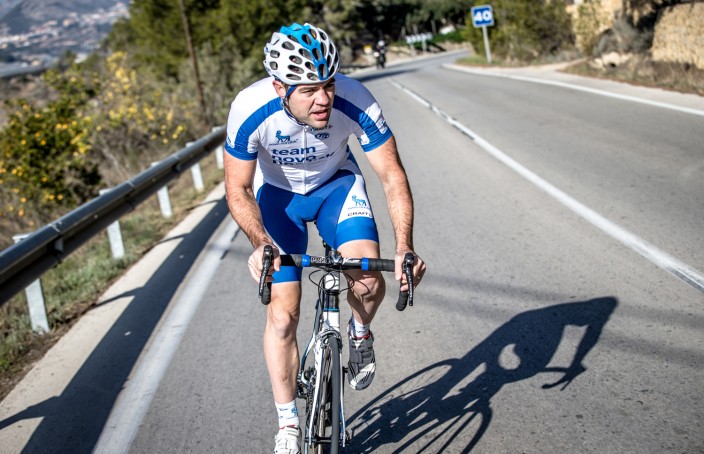Joe Eldridge dreamed of becoming an athlete as a youngster and refused to let type 1 diabetes stop him from becoming a professional cyclist. Now retired, Joe is focused on sharing his story with others and hopes to inspire other people with diabetes to pursue their dreams.
Joe was 10 when he received his diagnosis. An American, he played several sports at high school, and only rode a bike as part of his overall diabetes management plan. He met fellow type 1 Phil Southerland at Auburn University and they started riding with a group of cyclists which quickly led to racing.
The two of them developed a close friendship and went on to create Team Type 1, a multi-team organisation of athletes now known as Team Novo Nordisk. 11 years after its inception, the team now fields competitive groups of cyclists, triathletes and runners with type 1 and type 2 diabetes.
Eldridge turned professional in 2008 and went on to become a United States track national champion (team pursuit, 2012). He achieved great success on the bike before retiring in late 2014, and now wants to share his experiences with others: in March 2016, Joe spoke at the first-ever Talking About Diabetes (TAD) conference.
Joe sat down with Diabetes.co.uk to discuss his type 1 diabetes and managing his blood sugar levels both on and off the bike.
Q. How have you found managing your diabetes since retiring?
“It is a full-time job to manage your diabetes when you are competing at the highest level of sports. I raced professionally for seven years, which is a long time, but it requires just as much discipline when you are not competing. As a person with diabetes, you constantly have to be adapting to your current situations in order to manage your diabetes well.”
Q. Is having type 1 something that may have motivated you to succeed more growing up?
“When I was diagnosed, I had no idea what diabetes was and how it would affect my life. I was never told I couldn’t do the activities my friends were doing so I never let it stop me. I think being diagnosed did motivate me to manage other aspects of life while growing up. I knew in my mind if I could manage my diabetes – a condition that affects me in every scenario you can think of – I could manage whatever challenges ‘normal’ life would throw at me. That gives me a lot of confidence.”
Q. How long did it take you to develop a medication routine that suited you for training and competitive races?
“Diabetes management changes all of the time. Each day I would have to make small changes to adapt to the way my body was reacting but also to that day’s training and racing schedule. It always changed and I worked closely with my health care professional to find the regime that worked best for me. I checked my blood sugar often to see what my needs were. If my blood sugar was above target, I may have taken medication. If my blood sugar was below target, I may have eaten or drank something with carbohydrate.”
Q. Did you have to make any dietary changes to improve your diabetes control, either growing up or as an adult?
“Having to manage your diabetes gives you a very good understanding of how the foods that you eat will affect your body and blood glucose levels. I eat a consistent diet and tend to lean toward foods and meals that I am familiar with. I would eat the same thing before training and racing because I had figured out how my blood sugars were going to react. This can often help you to be prepared with enough energy for the long races.”
Q. Has being an ambassador for diabetes become a part of who you are?
“If there is a cure for diabetes tomorrow, I will not have a void to fill in my life. Who I am is a husband, a father, a friend, and a hard worker. I just happen to have diabetes and have the opportunity to share my story with others, hopefully inspiring them to pursue their dreams.”
Q. What advice would you pass on for young people with diabetes looking to follow a career in sport?
“Go for it! No matter what it is you want to do, make a plan and figure out how you can play the sport you want to play. It starts with checking blood glucose levels often, working with your healthcare team to figure out how sport is going to affect those levels, and then making small adjustments that allow you to compete.”
You can check out our Diabetes and Sport section for more information on managing diabetes during sport.
Pictured: www.teamnovonordisk.com



